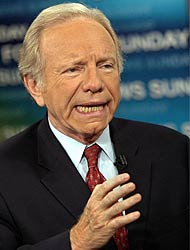A Bite of the Apple
Tuesday, October 31, 2006
God is indeed a personal affair. My own journey has taken me past several stops until I finally found one where I was comfortable in what a "relationship" with God meant for me.
The hard part, though, has always been articluating why that separation between Church and State is necessary and more importantly even possible when someone has at least my commitment, let alone much heavier views. Certainly, someone would consult God on their own actions. We see it with athletes, praying for a win. We see it in our troops, praying for peace or not to die or for safe passage.
So it is hard to say to a politician that they somehow have to separate that view. Certainly, giving the benefit of the doubt to some whom are truly spiritual, our Congressional Representatives would pray for guidance on how to treat an especially contentious issue.
In fact, there is nothing wrong with seeking a higher power's assistance with issues that seem too large for us to handle, or too important, or too confusing. That's what we have beliefs for! That's what God wants us to do!
It is in that where I began to understand, then, how a separation between Church and State works, and why. And a short, thought-provoking post from Kun Fu Monkey.
Whether allegorical or absolutely true, Eve bit that apple and so did Adam. And suddenly, bliss became reality. We saw things the way they are, and applied our own interpretation to them. But that became our gift! Reason and doubt became what we got: the ability to understand our universe and the ability to question God and become stronger in our faith because of it. If we weren't going to have bliss, then by God (no pun intended), we'll come to appreciate creation by unlocking its weridest and most complex mysteries rather than just by child-like wonder.
So then how do we get top the necessity of Church and State? It is not in that as soon as you are elected, you have to become blind to faith. Impossible, and unconstitutional (besides for prohibiting establishment of religion, it too prohibits quelling the free practice thereof). The separation is said very well in the post linked above:
Once one side of the political debate claims God, then their opponents are against God. A "good heart" matters more than the facts. To change policy is to reflect doubt in God's plan. To question the mortal, fallible men in authority is to question God himself.That's it. When one side of the debate claims sole access to God, the other becomes evil.
Moreover, as I pointed out in an earlier post, blind faith causes us to ignore what we see as true right before our eyes. Thus, when the simple fact that someone is faithful supercedes the truth as it is seen and written, we lose.
And worst of all, when one side has claimed God, claims access to truth through simply being faithful and moves Government along those lines, then as it is pointed out above, changing the plan or agenda becomes literally changing the will of God. That is why there is a wall between Church and State, as Thomas Jefferson put it. Not to exclude faith from our daily lives, or even when determining how an individual may act on a policy issue. It is to keep one side from claiming all access to faith, and thus destroying public policy (and lots of other issues) debate because there can be no debate. Public policy is not tied to God, as much as we like to think it is "because we prayed about it." Interestingly, when 10 people pray about one issue, you get several different answers. It is created by men, who are fallible by nature. We bit the apple, remeber, and gained and lost some things because of it. But by having a one-sided debate on an issue that claims sole access to God, we establish one single religion and only one correct viewpoint. Remember what we think was so unpalatable about much of hard-lined, conservative Islam?
Kevin Phillips, in American Theocracy, puts it when when he says, to paraphrase, that not applying reason to an issue because of religion is easy, because you never have to learn anything new. Therein lies the continuation of this thought: there is only one correct viewpoint, and any other ideas become unworthy of consideration. How does that advance public policy? How does that advance civil rights? How does that advance medical research?
It doesn't. Enjoy the bite of the apple we received, and use it to advance public policy. Read more...







